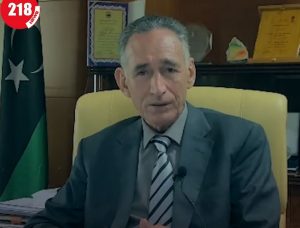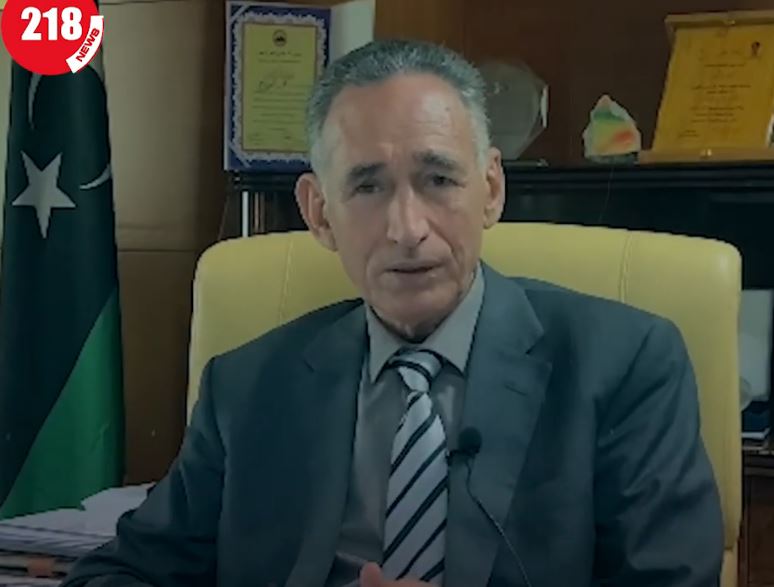By Sami Zaptia.

London, 8 September 2021:
Speaking in an exclusive wide-ranging interview to Libyan satellite TV channel 218, Minister of Economy and Trade, Mohamed Hwej, revealed that Libya’s losses due to instability from 2011 to 2020 amounted to one trillion dollars.
One trillion dollars of losses due to instability
He revealed that oil losses amounted to 155 billion dollars, social, infrastructure and reconstruction costs amounted to 576 billion dollars, the cost of equipment 69 billion dollars, and human and material losses $200 billion.
In addition, Libya’s gross domestic product decreased from $90 to $40 billion, and the value of the dinar decreased from 1.40 to 4.48, recording a 320 percent drop, in addition to that, the unemployment rate increased by 20 percent.
Libya’s economy dependent on three factors
Hwej stressed that the country’s economy depends on three basic elements, namely its geographical location, the number of people who possess high levels of education and creativity, in addition to financial reserves. He also highlighted the possibility of benefiting from what he referred to as Libya’s distinguished position in the global project of China.
Attracting foreign investors needs labour and stability
Speaking about plans to attract foreign companies to work in Libya, the Minister of Economy and Trade stressed the need to provide important workers, taking into account the imposition of security and stability, so that foreign companies can trust the country and establish successful investment projects to achieve the desired level of growth.
61 new foreign companies granted permission to work in Libya
Hwej stated that his ministry has granted permission to 61 new foreign companies to work in Libya, including:
- 13 contracting companies.
- 11 companies working in the electricity field
- One company working in the telecommunications field
- 26 companies working in the industry field.
- Four companies concerned with the environment.
- Three technical companies.
- One inspection company.
Egypt then Turkey top list of countries to implement construction projects
The Minister of Economy indicated the countries concerned with participating in the reconstruction of Libya and contributing to the advancement of its national economy, are topped by Egypt, which will contribute to the reconstruction and creation of infrastructure, in addition to Turkey, which will contribute to the transfer of technology to build services.
U.S. and Germany for energy projects
He said America and Germany will handle most of the energy projects in country, whether oil energy or clean energy.
Oil production
On oil production, Hwej said: “Libya currently produces about 1.3 million barrels of oil per day, and it can raise production to three million barrels of crude, if the security situation is stabilized and the oil sector is kept away from political disputes.”
Potential resources
According to the statements of the Minister of Economy, Libya occupies the fourth place in the world in terms of shale oil reserves, stressing that it is rich in various natural resources such as the sea and the huge fish wealth it contains, in addition to minerals and sand, and is characterized by a climate that helps diversify agricultural production, as the south of Libya is the home of bulk wheat.
In addition to Libya’s possession of one of the most important Roman and Greek historical civilizations that attract millions of tourists, Hwej feared the current situation, saying: “The process of economic reform at this stage is very difficult.”
GDP potential of US$ 200 bn
According to Hwej, Libya’s gross domestic product (GDP) is 40 billion dollars, which is dominated by oil, and it is possible for Libya to raise the GDP to 200 billion dollars, as its economy is decentralized to bring about a noticeable development in it.
Creation of seven economic zones to facilitate foreign investment
Hwej has proposed the creation of a system of seven economic zones, so that the government can communicate with developed countries to raise the level of education, develop the health sector and hospitals, and promote investment in various sectors.
“We must set priorities, such as increasing investment in oil, providing food, medicine, and electricity, and transferring competition with international partners from negative to positive,” he added.
Exchange rate stability
Minister Hwej identified the weak point of the Libyan economy, noting that it lies in the instability of the exchange rate, and added that the Central Bank of Libya must defend the value of the dinar against foreign currencies, including the US dollar, according to criteria that are based on international rules set by the World Bank and the International Monetary Fund, which ensures control of inflation and improve standard of living.
Warning of foreign distractors
Hwej warned of international intentions and ambitions that are trying to distract the economic and financial scene in the country and seek to undermine the ministry’s plans to advance the national economy, stressing the importance of the private sector’s role in building the national economy.
Subsidies
He stated that his ministry had developed a plan that would subsidise commodities in a new way to ensure that subsidies would not be exploited in unhealthy areas. He revealed that the Cabinet had approved a number of commodities to be subsidised, in addition to establishing the Grain Bureau to maintain food security.
Grain bureau for food security
He stressed in the same context that Libya needs 1.250 million tons of soft wheat to produce flour, and the Grain Bureau will follow up the process of supplying the private sector to the local market with grain.
Grain production
Hwej said that the number of flour mills in the country is 68, 21 of which are in the western region, 34 in the eastern region, and 10 in the central region. As for the southern region, it contains three flour mills, and if it manages to develop the agricultural sector, Libya will not need to import wheat.
Libya imports 85 percent of its food from abroad
He revealed that barley extraction rate reached 75 percent, bran for fodder was 25 percent, local production of food commodities reached 15 percent, and Libya imports 85 percent of its food abroad.
Smuggling v Re-export
The Minister of Economy explained that there is a clear difference between smuggling and re-export. Smuggling, he explained, is what is meant by goods that are subsidized by the state, while re-export is the imported goods that enter Libya and are then re-exported.
Trade with neighbouring states reached LD 2 billion
The value of trade with neighbouring countries in 2020 amounted to about two billion dinars, divided as follows:
- Tunisia 1.1 billion dinars
- Egypt 500 million dinars
- Algeria 60 million dinars,
He said this was a modest number due to the conditions Libya is going through due to the lack of regulation of foreign trade relations.
Share of private sector’s contribution to the economy
Reviewing the private sector’s contribution to the GDP during eight years, Hwej said the Libyan private sector constituted:
- 57 percent of the GDP in 1963
- 46 percent in 1975
- 50 percent in 1981
- 60 percent in the early nineties
- 71 percent in 1999
- 30 percent in 2005
- 37 percent in 2011
- 40 percent in 2018
- 40 percent in 2020.
Libyan Chambers of Commerce are weak
He said there was a lack of support for the private sector in the field of research and development, and an absence of a competitive advantage. He said the Libyan Chambers of Commerce, Industry and Agriculture are still weak.
Banking sector crippling Libya’s economy
The economy minister said Libya’s banking system in Libya has also not been spared from security fragility and political division over the past years. He said the deterioration of the banking sector is crippling the economy, and that it needs to be rebuilt again, in accordance with international standards.
Coronavirus
Hwej said the pandemic exacerbated the deterioration of the national economy and contributed to the rise in prices at all levels, in addition to the decrease in production capacity and the cessation of economic activity due to the suspension of factories and laboratories, stressing that it is the citizen who paid the tax for these conditions.
Price controls
With regard to the price controls file, he confirmed that his ministry is working in coordination with the Central Bank of Libya to control prices at outlets, by calculating the value of credit, the value of transportation and the value of storage, in order to set the real price of a commodity, in addition to cooperation with the Municipal Guard, in addition to forming committees to track medicines, ascertaining their sources and production history.









